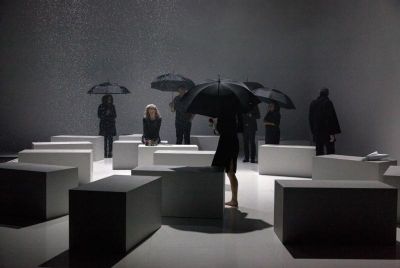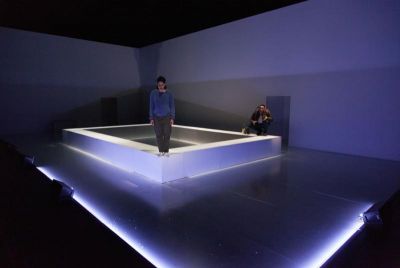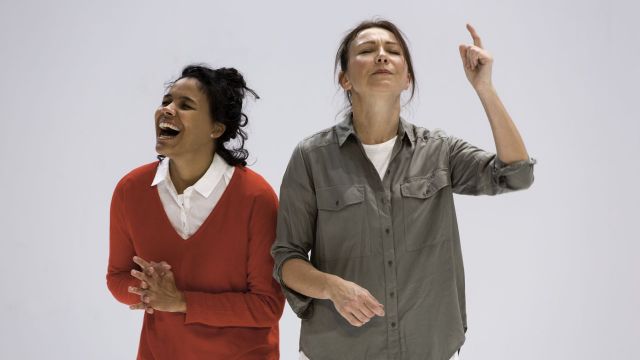Love and Information
Just when you thought you had seen all theatre has to offer and it was safe to go back in the water, along comes a shark by the name of Churchill to turn all your pre-conceptions upside down.
Love and Information is a conceit – and is, in almost equal parts, infuriating and exhilarating. It arrogantly throws out everything we know about theatre, and the nature of drama and linear narrative, and replaces it with a gigantic Haiku where the sum is greater than the combined value of the words….and there are words a-plenty.
Basically, the “play” has seven sections, which must be played in order, but within the sections are numerous scenes and a company chooses seven of these which may be played in any order, plus an obligatory end scene, 50 scenes in all – seemingly totally disconnected. There are no designated characters, no gender assigned dialogue…. Just words on the page – ready for interpretation.
One could be forgiven for thinking this sounds pretentious in the extreme, but this is not a play you dismiss when you leave the theatre. In fact, this is not a play you dismiss at all. Thirty six hours later I am still holding conversations in my head and reeling at the accessible simplicity of the most complex questions in humanity. There are perhaps 8 scenes in the play which tear at the heart and are unbearably moving. The first does not appear until halfway through the 105 minutes and concerns a elderly Altzheimers’s victim who has forgotten that he has the ability to play the piano; the last concerns a man who has fallen in love in Cyberspace and no longer understands the difference between real love and sensory overload. Sandwiched between is a stunning funeral scene, telling for two lines….when a supporter of the grieving widow says to her “I’ve never lost someone I’ve loved” (Sic) and she responds “I’m sorry.” It has impact within its context – but it has far more in the middle of the night when the full import of the old adage ‘No Ecstasy without Agony’ clicks into place. Connection.
 The other 42 scenes come and go…there are laughs aplenty, some innovative staging, lovely performances, and, on the surface, not a lot else. There’s a rule in editing – what is this scene for? What does it do? WHY? What is the point?
The other 42 scenes come and go…there are laughs aplenty, some innovative staging, lovely performances, and, on the surface, not a lot else. There’s a rule in editing – what is this scene for? What does it do? WHY? What is the point?
Perhaps the point is to show us there is no point. We live in a world of information overload. Our senses simply can’t cope with all that is thrown at us and our attempts to prioritise are limited by our human frailties. We’re not built like computers. What’s trivial may seem important; what’s important washes over us like the giant Tsunami that looked so great on the telly with the cars washed away. It simply doesn’t connect with three thousand dead people. What’s absorbed may not be processed, or comprehended. And yet…..
Information without context is still valid to a computer, but it means nothing to human beings. We need a conduit, a connector, an adaptor. The thing that connects us; which makes information more than ‘Sound and fury signifying nothing’ is Love – in all its definitions. It is emotion, pure and simple, the ability to feel, that gives information meaning, allowing us to connect with our inner selves and with others. It is such a breathtakingly simple idea, and yet the road to saying – truthfully – “Now I understand”, is a lifelong journey and some never complete it. There is a scene, full of chuckles, where a young man who can actually feel emotions but cannot feel physical pain of any kind, asks two girls to explain/describe it to him. It’s an impossible task….information without context. That’s the metaphor. Each of us mere mortals will be touched…or not …in different ways.
 Kip Williams has done an extraordinary job with his brilliant ensemble cast and the white cubist set. It’s exemplary theatre and even the odd weakness isn’t what it appears to be. The cast move the blocks in the set to form the shapes needed, another metaphor for creating a world we are comfortable in, where we can feel safe….and which is of our own choosing. We feel uneasy and challenged when two women suddenly appear in sequinned dresses. It’s a marvellous concept complemented by the lighting design and sound-scape.
Kip Williams has done an extraordinary job with his brilliant ensemble cast and the white cubist set. It’s exemplary theatre and even the odd weakness isn’t what it appears to be. The cast move the blocks in the set to form the shapes needed, another metaphor for creating a world we are comfortable in, where we can feel safe….and which is of our own choosing. We feel uneasy and challenged when two women suddenly appear in sequinned dresses. It’s a marvellous concept complemented by the lighting design and sound-scape.
The marrying of Playwright, Director, cast, crew and AUDIENCE take theatre into a new area, a stratosphere where all things are possible. The problem for Churchill is…how does she follow it? If I were she, I’d be tempted to leave it there.
Super and Superb theatre.
Coral Drouyn
Ensemble cast: Marco Chiappi, Harry Greenwood, Glenn Hazeldine, Anita Hegh, Zahra Newman, Anthony Taufa, Alison Whyte and Ursula Yovich.
Photographer: Pia Johnson.
Subscribe to our E-Newsletter, buy our latest print edition or find a Performing Arts book at Book Nook.

